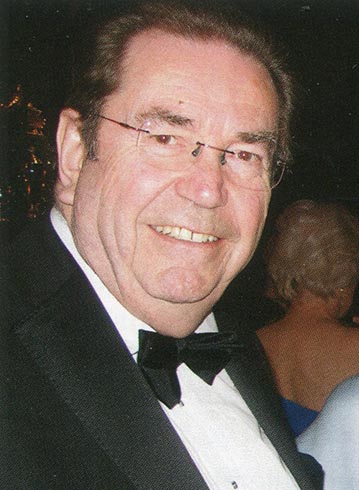Obituary for The Guardian
 Photo: NLCLord David Chidgey, who has died at the age of 79, came into parliament via local government. During his eleven years in the House of Commons he was one of only seven chartered engineers. He was committed to his native Hampshire and was elected to his local New Alresford Town Council in 1976 and then to Winchester City Council in 1987. He had wider aspirations than local government and whilst in the middle of fighting the Hampshire Central European Parliament by-election in Autumn 1988 he approached the Liberal Democrats’ regional chair with a view to becoming a parliamentary candidate. He was adopted as the party’s candidate for the Eastleigh constituency, adjacent to his Winchester home, winning it at the second attempt in February 1994 at a by-election caused by Eastleigh’s Conservative MP death in unusual circumstances. He held the seat twice thereafter before retiring at the 2005 general election. He was created a life peer in May 2005.
Photo: NLCLord David Chidgey, who has died at the age of 79, came into parliament via local government. During his eleven years in the House of Commons he was one of only seven chartered engineers. He was committed to his native Hampshire and was elected to his local New Alresford Town Council in 1976 and then to Winchester City Council in 1987. He had wider aspirations than local government and whilst in the middle of fighting the Hampshire Central European Parliament by-election in Autumn 1988 he approached the Liberal Democrats’ regional chair with a view to becoming a parliamentary candidate. He was adopted as the party’s candidate for the Eastleigh constituency, adjacent to his Winchester home, winning it at the second attempt in February 1994 at a by-election caused by Eastleigh’s Conservative MP death in unusual circumstances. He held the seat twice thereafter before retiring at the 2005 general election. He was created a life peer in May 2005.
Chidgey was born in Basingstoke, the son of Cecil, an army officer, and Winifred (née Weston). He attended Brune Park County High School in Gosport and went on to study Mechanical and Aeronautical Engineering as a civilian student at the Admiralty College in Portsmouth, qualifying as a Mechanical Engineer. He then studied Civil Engineering at Portsmouth Polytechnic. His initial employment was five years with Hampshire County Council on traffic engineering projects before going into the private sector. During this latter employment he undertook work in West Africa and in Oman which began his involvement in overseas projects which he continued throughout his parliamentary career. Later he managed major projects to provide water, electricity supplies and transport networks in a number of countries including Bangladesh and Brazil as well as in West Africa and the Middle East. His professional expertise was recognised by a number of awards including the Fellowship of the Institution of Civil Engineers. In 1965 he married April Idris -Jones and they had a son, David, and two daughters, Joanna and Caitlin.
In the 1987 Winchester City Council he gained his local ward but did not defend it four years later choosing to concentrate on his parliamentary candidature and career. In parliament he became first the party’s spokesman on transport for which his engineering experience and Eastleigh’s history as a railway town were highly appropriate, particularly at a time when railways privatisation was being fiercely debated. He then developed his long interest in Africa and became a member of the Select Committee on Foreign Affairs. His expertise, particularly on African matters, was recognised by a number of institutes and think tanks such as the Commonwealth Studies Unit where he became chair of its oversight committee. At various times he was also the party’s spokesman on Employment and on Training, Trade and Industry. He led the successful campaign that blocked plans by major high street banks to increase charges significantly at cash dispensing machines which would have disproportionally affected poorer people. During his last four years in the House of Commons he was a member of the Speaker’s Panel occasionally deputising for the Speaker.
When he moved to the House of Lords he became the party’s specialist front bench spokesman of African development and on human rights issues. In July 2010 he contributed an article to The Guardian on the difficulties of the countries of Africa’s Great Lakes region. He was also active in debates on issues that affected his locality, particularly when he could bring to bear his professional experience. One such were his parliamentary speeches on the protection of chalk streams which flowed through the local rivers in his beloved Hampshire. His last speech towards the end of 2021 was in a debate on the controversial House of Commons amendments on the Environment Bill in which he played a part in the government’s climb down in favour of stronger action by the water companies on sewage control. Chidgey was a diligent caseworker and rather than making a political issue out of individual personal and local issues he preferred to be the thoughtful and thorough problem solver. His unassuming way of walking down from his constituency office each day to buy a lunchtime sandwich provided an informal opportunity for him to be approached by constituents and he was amused rather than annoyed by their regular failure to pronounce his name properly, being often called “Mr Chidley”.
With his internationalism and his attention to environmental issues Chidgey was a natural Liberal and he was much respected by his parliamentary colleagues. He was somewhat reserved in personality but his easy conviviality was evident in his active involvement in the National Liberal Club in which he used his experience and his contacts to assist with meetings on overseas affairs. He was also a long term member of its General Committee and particularly of its Wine Committee.
He is survived by April, David, Joanna and Caitlin, and two grandchildren.
David William George Chidgey, Baron Chidgey of Hamble-le-Rice, engineer and politician, born 9 July 1942, died 15 February 2022.
